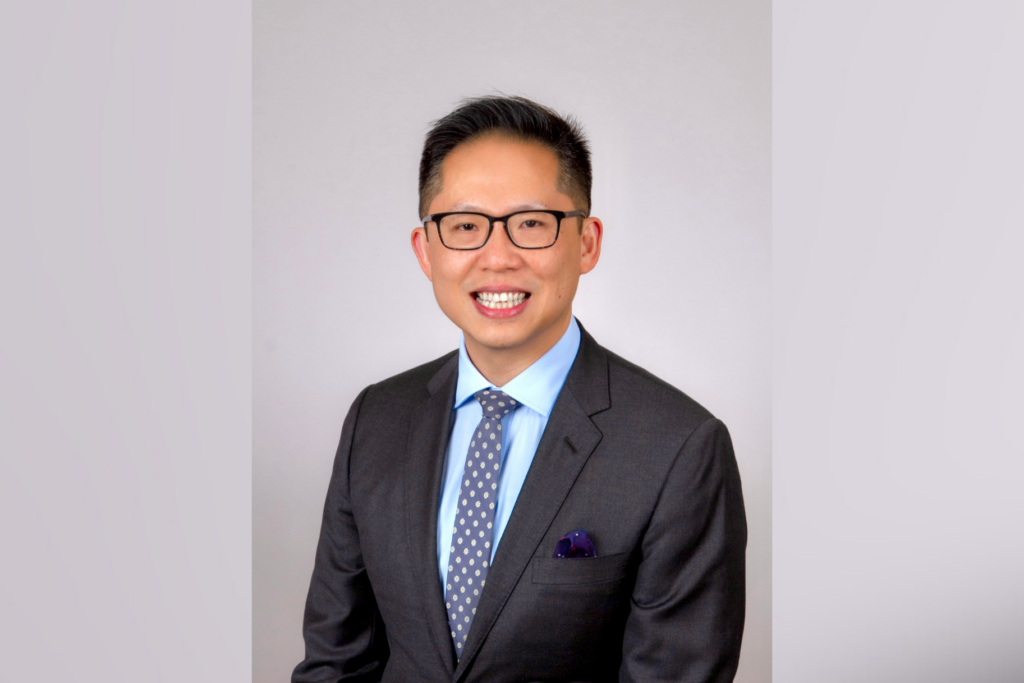After 12 years as a practicing physician, David Cheng’s desire to address systemic issues in health care led him to enroll in an online graduate program at USC. Before even finishing the program, he had a chance to make an impactful career pivot.
Cheng enrolled in the Executive Master of Health Administration (EMHA) online program while working as a full-time faculty member at USC in the neurosurgery department. While he started the program intending to transition his career, he had no idea the opportunity would come so soon, he said.
The USC Price School of Public Policy program appealed to Cheng because of its big-picture focus on health care.
“I realized that many of my patients’ challenges were rooted in systemic inefficiencies, but as a clinician, there was only so much I could do,” Cheng said. “I wanted to make a broader impact on health care delivery.”
The program’s online format and option for a part-time schedule allowed him to balance his work, family life and his own teaching responsibilities at USC. Classes provide historical context on health care delivery and how it has transformed, as well as policy and economics. They also gave Cheng insight into how executives approach hospital-wide challenges, including financial ones.
“Tackling complex operational challenges as a health care executive requires a deep understanding of system-based practices and the ability to convey that understanding and implement changes,” Cheng said.
One of the most valuable aspects of the program, however, was the connection forged with professors.
“Almost all of the professors gave us their personal cell phone numbers and encouraged us to text or call with any questions,” Cheng said.
This personalized access to professors became especially important when Cheng faced a major career opportunity — an associate chief of staff position at VA Long Beach. Health services administration and policy professor Michael Harris was instrumental in supporting Cheng through multiple rounds of interviews, which were unfamiliar territory, with different questions and formats from the clinical interviews Cheng had previously experienced.
“I never expected my career to change so quickly,” Cheng said. “I’m very grateful to Professor Harris for his guidance and support — he’s been invested in my success from the start. We would often talk after hours, even on weekends. He has truly been a godsend for me.”
Cheng landed the job — and set to work putting what he’d learned into practice.
One of Cheng’s major motivations in changing careers was his desire to improve patients’ experiences, from navigating insurance to facing hospital bureaucracy. He also wanted to address the workforce challenges that have afflicted the health care sector since the COVID-19 pandemic began. His new position allowed him to do both, while also making a positive impact on veterans.
“Veterans are a vulnerable and often underserved population,” Cheng said. “I am honored to serve as the inaugural associate chief of staff for Rehabilitation and Extended Care at VA Long Beach. In this role, I am directly involved in improving safety, patient experience, access and quality of care in our health care system. Work is especially exciting and meaningful because I am doing and learning something new every day. This opportunity would not have been possible without my education at USC.”
Cheng is set to graduate in 2025. He said the EMHA has given him a bird’s eye view of the operational challenges health care administrators face and how to tackle them.
USC Price’s EMHA program is a popular choice for physicians like Cheng and other health care professionals, such as clinicians and nurses. But it isn’t limited to those with health care experience — past students also include IT professionals and finance officers.
“The EMHA program offers clinical and management professionals the opportunity to advance their health care careers and to effectively improve health services within their communities,” Harris said. “The over-arching goal of the EMHA degree program is to prepare students for management and executive positions in hospital systems, managed care organizations, physician groups, ambulatory care systems, consulting groups and government agencies. Our diverse curriculum focuses on health care policy, quality assurance and regulation, finance, performance assessment and evaluation. As with Cheng, our students are confident leaders who are eager to address the challenges of improving the health care delivery model.”
Still, Cheng advises prospective students — whether they are doctors looking to diversify their skills or other health care providers — that a degree alone won’t change their life or career. A degree is an important step for people interested in making a career switch, but this should also be accompanied by mentorship and experience, he said.
“I highly recommend USC’s EMHA program to any clinician aspiring to health care leadership,” Cheng said. “It complemented my clinical experience with essential knowledge for health care executives, including patient engagement, population health, quality improvement and operations management. My education at USC provided the foundation that allowed me to explore opportunities beyond clinical care.”
Learn more about the Executive Master of Health Administration online program today.


